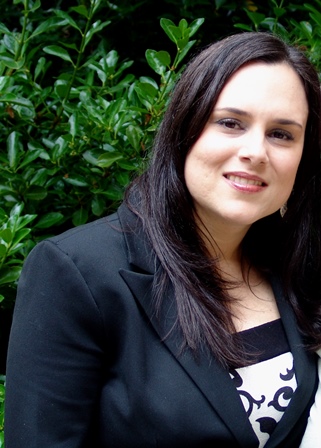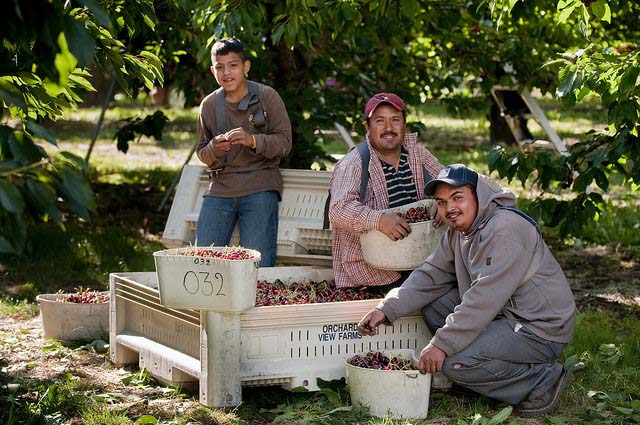Life Experiences Inspire Crucial Research into Health Disparities for Latino Children
January 29, 2016
By Carol Dennis
Imagine the scene.
A neo-natal unit at a small city
hospital. Two babies lie side-by-side, both kicking their little legs under their
individual plastic enclosures, hooked up to wires and tubes.
One baby is
continuously nurtured by her parents. Her mother is there almost round-the-clock
to be sure her baby gets breast milk and is held, and all the things that
research has shown can improve a premature baby’s chance to thrive.
The other baby is cared for mostly by the nursing staff, with occasional family visits from mom and dad and grandmother – looking confused and lost and exhausted.
“You’re such a good mom,” the staff tells the first mother, acknowledging her constant devotion to her child. But what of the other family? Not as dedicated? Not as in love with their newborn? Or is this more a tale of access and resources?
Not far from her own experience
 This is one of the stories that has inspired the research of WOU Associate
Professor Doris I. Cancel-Tirado, Ph.D. And for Dr. Cancel-Tirado, this is not a
hypothetical. She was the “good mom” in this scene, and saw first-hand the
disparity in healthcare access based solely on family circumstances.
This is one of the stories that has inspired the research of WOU Associate
Professor Doris I. Cancel-Tirado, Ph.D. And for Dr. Cancel-Tirado, this is not a
hypothetical. She was the “good mom” in this scene, and saw first-hand the
disparity in healthcare access based solely on family circumstances.
Feeling these disparities is not far from Dr. Cancel-Tirado’s personal experience. Her Puerto Rican accent often places her in the position of having to fight the assumption that she is uneducated, that she’s in the country illegally, and does not have health insurance. “When they find out I’m educated, I’m treated very differently,” Dr. Cancel-Tirado explains. “And this happens a lot in healthcare.”
She saw very clearly in that neo-natal ICU that her baby and the baby in the next crib would have very different trajectories in life just because of the circumstances of their families. “The other mother is a good mother too,” Dr. Cancel-Tirado insists. “Maybe she doesn’t get the opportunities.”
These trajectories inspire her work

“I am extremely honored to receive this prestigious grant from one of the organizations that I admire the most," says Cancel-Tirado. "This award will allow me the time and resources needed to conduct high quality multilevel research to better understand health disparities among low-income rural Latino children.”
This research project goes to the core of Dr. Cancel-Tirado’s passion, allowing
her to explore the impact that family and community circumstances have on the health
of rural Latino children. It will also allow her to explore Latina mothers’
perceived opportunities and barriers to providing their children the best
foundation for healthy development and productive lives.
Where farm workers are valued and nurtured the outcomes are different

Combining existing data sets
It was Dr. Cancel-Tirado’s idea of combining the Multi-State data from the Rural Families Speaks project and the RWJF County Health Rankings & Roadmaps that won her the $100,000 grant.
The Foundation has ranked counties across the country on many different health measures, including quality of life, health behaviors, social and economic factors, and physical environment. The Rural Families Speak project is a multi-state data-base focusing on the interactions of individual, family, community, and policy contexts on physical and mental health in diverse rural low-income families.
“I’ll be doing a multi-level analysis,” Dr. Cancel-Tirado says, “trying to look at layers of influence on Latino children – specifically health disparities on Latino children in rural areas of Oregon.”
No data sets that have these three levels in this way
Dr. Cancel-Tirado’s research will be doing secondary data analysis – looking at the existing data from the RWJF County Health Rankings and Rural Families Speak to do an in-depth analysis of the existing quantitative and qualitative data. She will follow this up with a third wave of research in which she will create individual case studies – three hour interviews with families. Half of the families will be Latino, the other half will be non-Latino.
“Currently, there are no data sets that have these three levels in this way,” Dr. Cancel-Tirado continues, “combining the two existing data sets and then adding case studies to do this level of analysis.”
The Latino Paradox
When Latino immigrants (even the poorest ones) come to the United States, on average their health is better than white middle class Americans. With the passing years, that starts wearing down because of these disparities.
Dr. Cancel-Tirado wonders, “How can we build on these advantages that immigrants come here with? I hope this study can help us see how we can build on these strengths.”
The results of this project will inform initiatives to support low-income Latino children that could potentially decrease health disparities, an important building block in the foundation for creating a Culture of Health in rural communities across the United States.
Doris Cancel-Tirado, Ph.D., is an Associate Professor at WOU in the
Department of Health and Exercise Science. The RWJF grant is managed
through TRI and is housed in TRI's Center for Health and Human Services.
Recent News Items
Closing the Achievement Gap Through STEM Education Nov 18, 2016
TRI Staff Members Present at NAEYC Conference in Los Angeles Nov 10, 2016
Three More Years for Campus Against Sexual Assault Program Nov 9, 2016
TRI's Serra Acar Appointed as DEC Recommended Practices Ambassador for Oregon Oct 13, 2016